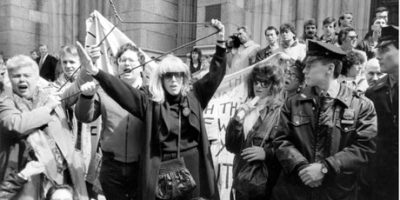Ambivalence: When the Abortion on the Table Is Your Own
At the age of 40, partnered and with two small sons, I discovered that I was unintentionally pregnant. We had recently moved cross-country, bought and renovated a house that turned out to be much more derelict than we’d thought, and learned — the hard, lawsuit way — that not everyone is a good human being when they owe you money. My career had been primary in our marriage, but now it was Steven’s turn; he was on the cusp of starting a non-profit, a much delayed dream. He had no interest in a third child.
I, on the other hand, always wanted my kids to have a little tribe; I wanted Steven and me to be outnumbered. I also wanted a daughter. But I knew that the timing was very rough. Besides the clarity of Steven’s vote, our family life was chronically harried, our marriage compromised by stress, and the two children we already had (only 18 months apart) sorely needed more parental attention. On the third hand, none of this was truly life or death; we knew that.
Politically speaking, Steven and I were both staunchly pro-choice. In college, I had minored in Women’s Studies and worked for the Religious Coalition for Abortion Rights, and when I was pregnant with my sons, I used the word “fetus” — never “baby” — in part because I’d experienced the vulnerability of attachment and loss through a miscarriage of my own, but more expressly as a statement of solidarity with women who’d had abortions.
And then, well, this sounds ridiculous, but there was gardening, and the issue I always confronted when I needed to weed. I could never pull up unwanted plants without a knot in my stomach and a feeling of moral dread. Who am I to decide what should live and what should die? I thought. It’s in the wrong place. There’s too much of it. Being Jewish, my thoughts turn to Mengele, “selections,” genocides. There are too many of those people. Those people don’t belong here. I have a deep ambivalence about human beings’ power to determine life or death. As a Jewish educator, I often teach the first two chapters of Genesis, highlighting their polarized standpoints on human beings’ purpose on our Earth. In the first chapter, we’re here to dominate and control God’s creations. But in the second, we are shomrei adamah, guardians of all life on this planet.
—-
It was still very early, I was in the first month of my pregnancy, when Steven and I drove downtown to the clinic. We got off the elevator at the ninth floor and were struck by the panoramic view: vast, majestic mountains, a startling river, rain falling from an otherwise clear-blue sky. Mountains that had been there and will be there forever. We’re just piddling specks of dust, I thought, in this giant universe. Suddenly, our worries about having another kid seemed trifling.
“We can do this,” Steven said, to my total surprise. “We can have this child. In a few short years, we’ll be fine.”
The nurse called us in and we discussed the procedure in detail, then asked for a few moments to think. We went back out to the windows, then I pushed the button and the elevator came. We got on. We just couldn’t do it.
—-
Classical Jewish texts tell us that it’s permissible to abort before 40 days, as the fetus is “mere fluid”. I had probably been pregnant around 20 days. But as a woman who had already birthed two children, who had done everything possible to nourish life growing within me, who had facilitated miracles, I felt clear that life had taken hold. To abort was to kill potential life. Spiritually speaking, I had become a person who was pro-life. How complicating.
Six days passed. Steven and I drove back to the clinic. But this time, instead of gazing out the windows, I focused ungenerously on the doctor. He seemed all wrong. He looked to be in his seventies — old — he wore a thick gold chain and a diamond pinky ring — rich — and he was gruff, taciturn and inarticulate.
“Why do you do this?” I asked challengingly. If his motives were suspect, I’d have cause to walk out again.
Instead, the doctor opened up and got emotional, describing experiences he’d had as a medical resident, seeing women dying from illegal, often self-performed, abortions. He was retired, he said; he didn’t do this for the money. I was moved. We had a shared sense of humanity.


